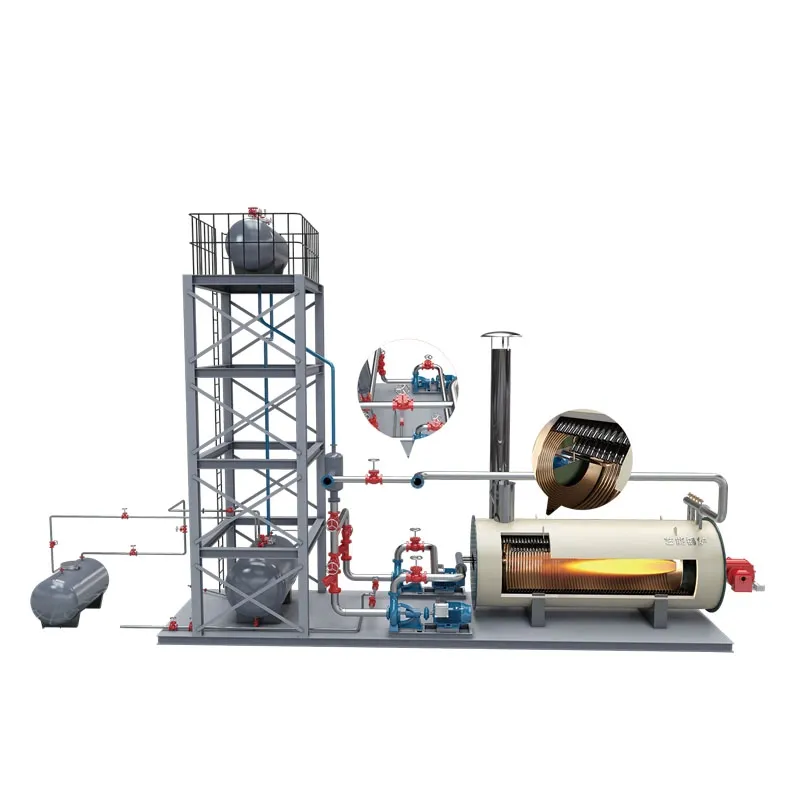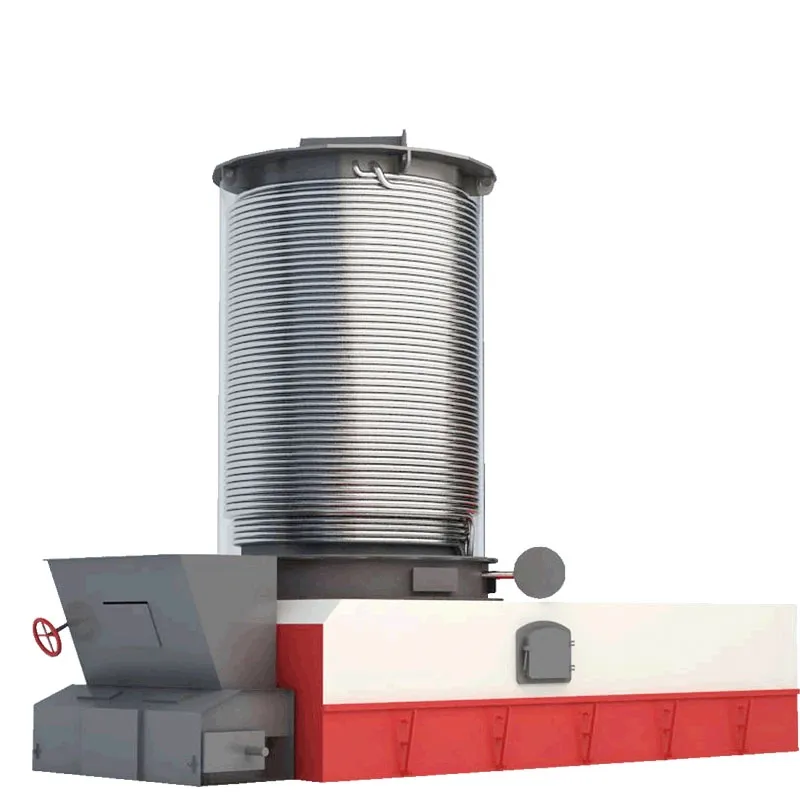Thermal Oil Boilers High-Efficiency Gas/Diesel Heater Systems
- Overview of Thermal Oil Boiler Systems
- Technical Advantages of Gas/Diesel Oil-Fired Thermal Oil Heaters
- Comparative Analysis of Leading Manufacturers
- Custom Solutions for Industrial Applications
- Case Studies: Real-World Performance Metrics
- Key Considerations for Selecting a Supplier
- Future Trends in Thermal Oil Boiler Technology

(thermal oil boiler)
Understanding the Role of Thermal Oil Boiler Systems
Thermal oil boilers, also known as hot oil heaters, are critical for industrial processes requiring precise temperature control. Unlike steam-based systems, these boilers utilize synthetic or mineral-based oils to transfer heat efficiently at temperatures up to 400°C. Industries such as chemical manufacturing, food processing, and textiles rely on gas or diesel oil-fired thermal oil boiler
heaters for their operational stability and energy efficiency. For instance, modern systems achieve thermal efficiencies exceeding 90%, reducing fuel consumption by 15–20% compared to traditional steam boilers.
Technical Advantages of Gas/Diesel Oil-Fired Thermal Oil Heaters
Gas and diesel oil-fired thermal oil heaters offer distinct benefits, including rapid heat-up times (30% faster than electric models) and lower carbon footprints. Advanced combustion technology ensures NOx emissions below 100 mg/Nm³, meeting stringent environmental standards. Additionally, their modular design allows seamless integration into existing infrastructure, minimizing downtime during installation. Manufacturers often incorporate fail-safe mechanisms, such as dual fuel options and automated pressure relief, to enhance operational safety.
Comparative Analysis of Leading Manufacturers
| Manufacturer | Max Temp (°C) | Efficiency (%) | Fuel Flexibility | Warranty (Years) |
|---|---|---|---|---|
| Supplier A | 400 | 92 | Gas/Diesel/Biomass | 5 |
| Supplier B | 380 | 89 | Gas/Diesel | 3 |
| Supplier C | 420 | 94 | Gas/Diesel/Hydrogen | 7 |
Custom Solutions for Industrial Applications
Leading oil gas fuel thermal oil heater factories provide tailored solutions to address specific industry needs. For example, a chemical plant requiring 24/7 operation might opt for a dual-fuel system with redundant pumps, while a food processing unit could prioritize stainless steel heat exchangers to meet hygiene standards. Custom thermal capacities (ranging from 100 kW to 30 MW) and pressure ratings ensure compatibility with diverse workflows. Over 60% of suppliers now offer IoT-enabled monitoring for predictive maintenance.
Case Studies: Real-World Performance Metrics
A textile manufacturer in Germany reduced energy costs by 22% after replacing legacy boilers with a gas-fired thermal oil system from Supplier C. Similarly, a U.S. asphalt plant reported a 40% decrease in downtime after adopting a modular heater with automated diagnostics. These cases highlight how oil gas fuel thermal oil heater suppliers deliver measurable ROI through optimized design and robust engineering.
Key Considerations for Selecting a Supplier
When evaluating oil gas fuel thermal oil heater suppliers, prioritize certifications (ISO 9001, ASME), after-sales support, and scalability. Suppliers offering localized service teams reduce response times for emergencies by up to 50%. Additionally, review third-party performance audits and client testimonials to verify reliability. For instance, Supplier A’s 98% customer retention rate underscores its commitment to long-term partnerships.
Innovations Shaping Thermal Oil Boiler Technology
The future of thermal oil boiler systems lies in hybrid energy integration and AI-driven optimization. Pilot projects combining hydrogen combustion with traditional fuels have shown a 12% reduction in CO₂ emissions. Furthermore, predictive algorithms can now anticipate maintenance needs with 95% accuracy, minimizing unplanned outages. As industries demand greener solutions, gas or diesel oil-fired thermal oil boiler heaters will remain pivotal in balancing efficiency and sustainability.

(thermal oil boiler)
FAQS on thermal oil boiler
Q: How does a gas or diesel oil-fired thermal oil boiler heater work?
A: A gas or diesel oil-fired thermal oil boiler heater circulates thermal oil through a closed-loop system. The oil is heated by burning gas or diesel fuel in a combustion chamber and transfers heat to industrial processes without vaporizing, ensuring efficient and stable temperature control.
Q: What factors should I consider when choosing an oil gas fuel thermal oil heater supplier?
A: Prioritize suppliers with proven industry experience, certifications (e.g., ISO, ASME), and customizable solutions. Ensure they offer reliable after-sales support, energy-efficient designs, and compliance with safety standards for long-term operational reliability.
Q: How often does an oil gas fuel thermal oil heater require maintenance?
A: Routine maintenance, including inspecting pumps, valves, and burners, should occur every 3-6 months. Annual professional servicing is recommended to clean heat exchangers, check fuel lines, and ensure optimal performance and safety.
Q: What are the advantages of gas over diesel in thermal oil heaters?
A: Gas-fired thermal oil heaters typically have lower fuel costs, cleaner combustion with fewer emissions, and easier maintenance. Diesel may be preferred in areas without gas infrastructure but requires stricter emission controls.
Q: Can oil gas fuel thermal oil heaters be customized for specific industrial needs?
A: Yes, reputable factories design heaters with adjustable temperature ranges, flow rates, and pressure settings. Customizations may include corrosion-resistant materials, compact designs, or integration with existing control systems for seamless operation.
-
Top Industrial Boiler Contractors Supplier & Factory Quality Products & ServicesNewsJun.10,2025
-
Panasonic Hot Water Boiler - Reliable & Energy Efficient Heating SolutionNewsJun.10,2025
-
Pennco Steam Boilers High-Efficiency & Durable SolutionsNewsJun.10,2025
-
Industrial Boiler & Mechanical Solutions Efficient Industrial Heating SystemsNewsJun.10,2025
-
Panasonic Hot Water Boiler - Energy-Efficient, Reliable Heat SolutionNewsJun.10,2025
-
Premium Power Plant Steam Boilers High Efficiency & ReliabilityNewsJun.09,2025

